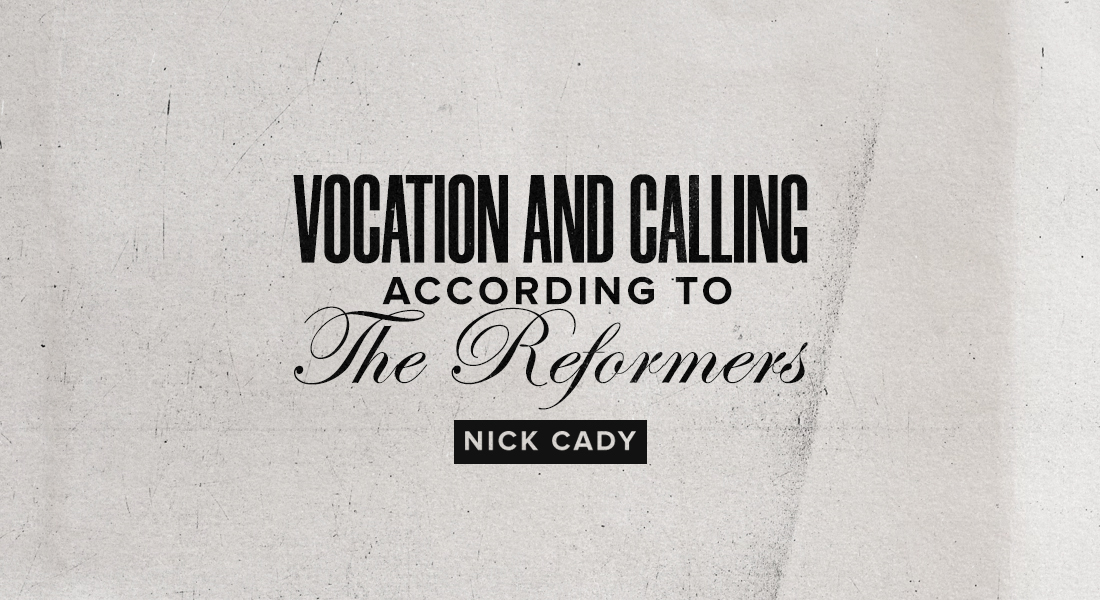
One question I am sometimes asked is how a person can know what their “calling” in life is. Some of the Protestant Reformers had a particular view on this topic which is helpful for us in how we think about “calling” in our lives.
The words “occupation,” “job” and “vocation” are used more or less interchangeably by people today.
“Vocational training,” for example, refers to training specific to a particular line of work. However, for the Reformers, the word “vocation” had a distinct meaning.
The word vocation comes from the Latin word vocare, literally: “calling.”
For the Reformers, to speak of work as vocation, reflected their view that “secular” work is actually a calling from God to do his work in the world and to love your neighbor by serving them in practical ways.
This was in contrast to the view which was held by the medieval Roman Catholic Church, which made a strong distinction between sacred and secular realms of life, the sacred realm being reserved for things directly related to religious or church work, and the secular realm being that of all non-church-related activity. This view, however, is still very common – and the language of “secular” vs “sacred” is still very prominent. Think about all the times you have heard people talk about “secular music” as opposed to “Christian music,” or if you have heard people talk about “secular jobs” as opposed to “ministry.”
To this, Luther wrote:
“What seem to be secular works are actually the praise of God and represent an obedience which is well-pleasing to him.’ Housework may have ‘no obvious appearance of holiness, yet those household chores are to be more valued than all the works of monks and nuns.’” (From Luther’s commentary on Genesis)
To the person struggling to find their calling, Luther might have responded, “Are you a husband or a wife? Are you a mother or a father, a child or an employee?” (See Colossians 3:17-24)
The Reformers would have pushed back against the concept of “finding your calling.” Your calling, they would have said, is not something mysterious or difficult to discern. It is the current circumstances of your life. If you are a mother, then your calling is to be a mother. If you are an office worker, then it is to be an office worker. There is a freedom to change what you do, but whatever you do, you are to view it as a calling from God to serve Him by serving your neighbor in that context. This is not to diminish the fact that God does call some people into “vocational ministry,” but rather to elevate the value of work done outside the church realm as genuine callings, which can be done as ministry: being God’s instrument to accomplish His work in the world.
Martin Luther used this example:
“Jesus instructed his disciples to pray: ‘Give us this day our daily bread.’ Consider how many people and jobs are involved in God answering that one prayer: there is a farmer who plants and waters and harvests grain. There’s a miller, who grinds the grain into flour. There’s someone who produces oil. There’s someone who transports the materials. There’s a baker. There is a grocer who sells the bread. All of these people, as they do their jobs, are contributing to the answering of this prayer: ‘Give us this day our daily bread.’”
He went on to point out that Psalm 147 says that God is the one who strengthens and protects a city, and yet this work is done through lawmakers and first responders.
What transforms a job into a calling is faith.
By faith, we see our daily activities as tasks given to us by God to be done for His glory and for the benefit of others.
By these criteria, we can also determine which jobs are not worth doing. If you do not believe that what you are doing is honoring God or contributing to the flourishing of other people, or if the way you make your money is actually detrimental to others, then the right thing to do might be to find another job.
This principle should not be taken to mean that you must not leave your job if, for example, the working climate or culture is unhealthy, or if you would simply like to pursue another career. It simply means that you ought to view whatever you do as a way to glorify God and do His work in the world by serving others.






